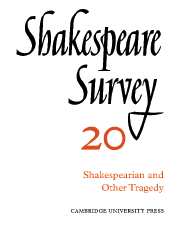Book contents
- Frontmatter
- Shakespeare, Fletcher and Baroque Tragedy
- Seneca and the Elizabethans: A Case-study in ‘Influence’
- George Chapman: Tragedy and the Providential View of History
- Critical Disagreement about Oedipus and Hamlet
- Shakespeare’s Thematic Modes of Speech: ‘Richard II’ to ‘Henry V’
- Anarchy and Order in ‘Richard III’ and ‘King John’
- The Staging of Parody and Parallels in ‘I Henry IV’
- Shakespeare’s Unnecessary Characters
- Walter Whiter’s Notes on Shakespeare
- Shakespeare’s ‘Romeo and Juliet’: Its Spanish Source
- The Grieves Shakespearian Scene Designs
- Shakespeare on the Modern Stage: Past Significance and Present Meaning
- Shakespeare in Brazil
- Recent Shakespeare Performances in Romania
- Shakespeare, the Twentieth Century and ‘Behaviourism’
- The Year's Contributions to Shakespearian Study 1 Critical Studies
- 2 Shakespeare’s Life, Times and Stage
- 3 Textual Studies
- Index
- Plate section
George Chapman: Tragedy and the Providential View of History
Published online by Cambridge University Press: 28 March 2007
- Frontmatter
- Shakespeare, Fletcher and Baroque Tragedy
- Seneca and the Elizabethans: A Case-study in ‘Influence’
- George Chapman: Tragedy and the Providential View of History
- Critical Disagreement about Oedipus and Hamlet
- Shakespeare’s Thematic Modes of Speech: ‘Richard II’ to ‘Henry V’
- Anarchy and Order in ‘Richard III’ and ‘King John’
- The Staging of Parody and Parallels in ‘I Henry IV’
- Shakespeare’s Unnecessary Characters
- Walter Whiter’s Notes on Shakespeare
- Shakespeare’s ‘Romeo and Juliet’: Its Spanish Source
- The Grieves Shakespearian Scene Designs
- Shakespeare on the Modern Stage: Past Significance and Present Meaning
- Shakespeare in Brazil
- Recent Shakespeare Performances in Romania
- Shakespeare, the Twentieth Century and ‘Behaviourism’
- The Year's Contributions to Shakespearian Study 1 Critical Studies
- 2 Shakespeare’s Life, Times and Stage
- 3 Textual Studies
- Index
- Plate section
Summary
In the comparatively short passage that he devotes to the subject of poetry in The Advancement of Learning, Bacon, who has just been discussing at some length the state of historical knowledge and enquiry, defines poetry as ‘nothing else but feigned history’. He then proceeds in characteristic fashion to examine its utility, saying of it:
The use of this feigned history hath been to give some shadow of satisfaction to the mind of man in those points wherein the nature of things doth deny it, the world being in proportion inferior to the soul; by reason whereof there is, agreeable to the spirit of man, a more ample greatness, a more exact goodness, and a more absolute variety, than can be found in the nature of things. Therefore, because the acts or events of true history have not that magnitude which satisfieth the mind of man, poesy feigneth acts and events greater and more heroical. Because true history propoundeth the successes and issues of actions not so agreeable to the merits of virtue and vice, therefore poesy feigns them more just in retribution, and more according to revealed providence.
(Bk. ii, iv, 2)Whether there is or is not a touch of irony in these remarks—the Neoplatonist Henry Reynolds was emphatically of the opinion that Bacon's whole attitude to poetry was a slighting one—that last sentence describes not only the way in which the poets, to Bacon's mind, handled the material of history, but also the way in which most historians handled it at the time when he was writing. The dominant tradition in historical works was still what R. G. Collingwood has called 'the providential idea'; and, some nine years later, in 1614, this approach to the past received its most impressive formulation in English with the publication of Sir Walter Raleigh's History of the World.
- Type
- Chapter
- Information
- Shakespeare Survey , pp. 27 - 32Publisher: Cambridge University PressPrint publication year: 1967

